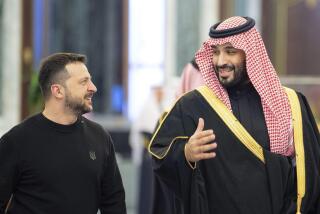Saudi crown prince says Israelis, Palestinians both have âright to have their own landâ
Reporting from Washington â Saudi Arabiaâs young crown prince said in an interview published Monday that Israelis, alongside Palestinians, âhave the right to have their own land,â seemingly opening the door to the possibility of an eventual normalization of ties with Israel.
Mohammed bin Salman, the 32-year-old heir to the Saudi throne, told the Atlantic magazine that any Mideast peace agreement would need to address the fate of Islamâs third-holiest site, which is located in Jerusalem, and ensure âthe rights of the Palestinian people.â Even so, his comments appeared to mark a break with the public posture adopted by most Arab leaders.
Two Arab countries, Jordan and Egypt, have peace treaties with Israel, but most Arab countries, including Saudi Arabia, do not recognize Israel. However, there have been recent signs of a warming between Israel and the conservative kingdom, whose aging monarch, King Salman, has already handed many leadership responsibilities over to the crown prince.
The Trump administration has pinned hopes on Saudi Arabia as a key interlocutor in any Mideast peace accord. Mohammed is currently on a U.S. visit thatâs focused on attracting investment and presenting himself as a reformist who has pushed for social changes such as granting Saudi women the right to drive.
The young crown prince is close to President Trumpâs son-in-law, Jared Kushner, and a bitter Saudi rivalry with Iranâs government dovetails neatly with Trumpâs own hawkish views on Tehran.
Critics are mistrustful of Mohammed, however, painting a recent anti-corruption drive by the crown prince as a thinly veiled power grab meant to sideline royal rivals and force wealthy business leaders to sign over billions of dollars in assets.
In the Atlantic interview, Mohammed was asked whether he believed that the Jewish people had the right to a nation-state in at least part of their ancestral homeland.
âI believe the Palestinians and the Israelis have the right to have their own land,â he replied. âBut we have to have a peace agreement to assure the stability for everyone and to have normal relations.â
Referring to the contested plateau in Jerusalemâs Old City revered by Jews as the Temple Mount and by Muslims as the Noble Sanctuary, the crown prince said Saudi Arabia had âreligious concerns about the fate of the holy mosque in Jerusalem and the rights of the Palestinian people.â
But he added, âWe donât have any objection against any other people.â
Although Trump has said he regards Mideast peace as âthe ultimate deal,â the rift between Israel and the Palestinians has widened during his tenure to date. Palestinians were infuriated by Trumpâs declaration that the United States recognized Jerusalem as Israelâs capital â seemingly dismissing a Palestinian claim to part of the city as the capital of their future state.
Saudi Arabia was among the many states across the Muslim world that denounced the Trump administrationâs stance on the holy city.
Trump has been inconsistent on what had for decades been a cornerstone of U.S. policy: support for side-by-side Israeli and Palestinian states. Mohammed, in the interview, suggested that shared economic interests might be a powerful driver of normalization efforts with Israel.
âIsrael is a big economy compared to their size, and itâs a growing economy,â he said. âOf course there are a lot of interests we share with Israel, and if there is peace, there would be a lot of interest between Israel and the Gulf Cooperation Council countries and countries like Egypt and Jordan.â
Saudi Arabiaâs position, like most other Arab states, has long been that there can be no ties with Israel until it cedes territory captured in the 1967 Middle East war to make way for a Palestinian state.
Under the rightist government of Prime Minister Benjamin Netanyahu, Israel has tightened its grip on Jewish settlements scattered across the West Bank, creating what Palestinians describe as an archipelago of territory that would be nearly impossible to stitch together into a viable state.
Under Netanyahu, however, there have been indications that Israel and Saudi Arabia were bonding over their common deep mistrust of Iran. Last month, Saudi Arabia opened its airspace to a commercial flight to Israel, a groundbreaking symbolic step that Israel greeted with near-euphoria. Reports have also surfaced of secret contacts between Israel and the Saudis, although both sides publicly maintain their distance.
ALSO
Trump meets with Saudi Crown Prince âMBSâ to push arms deals and challenge to Iran
Israel reaches agreement with U.N. on African refugees â then suspends it in face of criticism
15 Palestinians reported killed by Israeli fire as Gaza border protest builds
More to Read
Sign up for Essential California
The most important California stories and recommendations in your inbox every morning.
You may occasionally receive promotional content from the Los Angeles Times.










